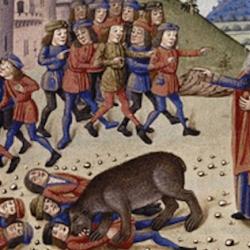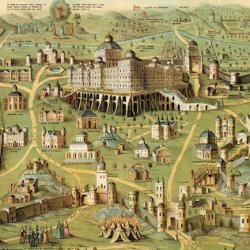The word “bed” is used nearly a dozen times in 1-2 Kings, and the uses represent a significant minor motif in these books. The following are some reflections on this motif, in large measure inspired by my students’ work.
1) 1 Kings begins with a report about David’s impotence and his bed-partner Abishag. The fact that he is bed-ridden provides important narrative background to the plot of Adonijah, who takes advantage of his father’s weakness and passivity to launch his coup attempt.
In addition, David’s bed resonates with a number of other passages and events. David’s passivity as king began in 2 Sam 11, where he lay in bed in Jerusalem while his army was in the field besiege the city of Rabbah. His adultery with Bath-sheba and murder of Uriah ultimately led to the rebellion of Absalom, which anticipates the rebellion of Adonijah in a number of specifics. That David is in bed in 1 Kings 1 thus sets the scene for another coup narrative. That David is passively lying in his bed while political operations swirl around him is another connection with 2 Samuel 11. Later, Adonijah will attempt to take Abishag to his own bed, another link to Absalom (2 Sam 16:20-23).
Further, David is the first instance of the “sick king” theme in 1-2 Kings. Sick kings represent sick kingdoms, impotent kings symbolize the impotence of a dynasty. Though Adonijah is David’s son, he is not the designated heir to the throne, and to that extent his coup threatens the continuation of the Davidic dynasty. Through the efforts of Bath-sheba and Nathan, David pronounces Solomon his heir and arranges for his coronation. The Davidic dynasty is thus reborn from the deathbed of David. David, impotent when the beautiful Abishag joins him in bed, revives to make his kingdom fruitful. King Solomon is “born” miraculously from impotent David’s bed, and David proves to be a true son of Abraham.
Throughout Samuel, David is presented as a new Jacob, a new Israel. And that too forms part of the background of 1 Kings 1. Like Jacob, David “bows on his bed” (1 Kings 1:47; Genesis 47:31), after he has made arrangements for the future. In this context, Adonijah is the new Reuben, the oldest son who is displaced from preeminence for going up to his father’s bed.
The bed chamber is private. A decision is made in secret, but the private decision is eventually proclaimed in the open. This is the movement in various places in Kings (pay attention to the “closed door”), and anticipates the public-private distinction that we find in the gospels, especially Mark.
Finally, there is a connection between the bed scene of 1 Kings 1 and the scene involving Jehoiachin in 2 Kings 25. The bed is a deathbed, analogous to the grave, where men are laid out horizontally in the earth from which they came. The fact that David’s kingdom is preserved from his deathbed points to the revival of the Davidic dynasty during exile. Exile is a death; Babylon is a grave; and Jehoiachin is in the even more grave-like condition of imprisonment. But the Davidic dynasty does not end in the grave; it will be brought from the tomb of exile, on the third day.
2) Royal beds in Kings are often deathbeds. David is dying on his bed; Ahaziah is injured and never comes down from the bed on which he has gone up; Hezekiah lies down and turns his face to the wall when he thinks he is going to die (2 Kings 20). In the last two cases, the ultimate outcome is radically different. From his bed, Ahaziah seeks the help of Baal-zebul, and instead hears an oracle from Elijah (the “Baal of hair”) that he will die on his bed (2 Kings 1). Hezekiah, by contrast, prays, and receives an encouraging oracle from the prophet Isaiah (2 Kings 20). Dying kings who seek help from prophets are revived; kings who seek help from idols die. (This is not always the case; Jeroboam seeks out the true prophet Ahijah when his son is ill, 1 Kings 14, and Ben-Hadad asks for help from Elisha; both Jeroboam’s son and Ben-Hadad die in bed.)
3) The power of prophets is underscored by two bed scenes involving Elijah and Elisha. Both raise boys to life by lying them on their own beds and stretching out on them (1 Kings 17; 2 Kings 4). The beds of prophets are life-giving, fruitful. That is why Ahaziah should have sought the Baal of hair instead of the Baal of Ekron: Because Elijah knows how to raise up the dead from their beds. When we mix in the bed-grave-exile connection, the message to the original exilic readers of Kings is evident: Those who “make their beds” with the prophets will be revived from the grave, the deathbed, of exile. Those who go after the gods of the nations will die on the bed where they have gone up. This is also part of the message of the story of the man of God and the old prophet (1 Kings 13): The old prophet wants to join the man of God in his bed/grave, so that his bones will be preserved.
4) Joash provides an interesting variation on this theme. When Athaliah goes on a rampage killing the royal seed, Joash (like Moses) is hidden away in a bed chamber. The bed chamber thus becomes a place of protection and security, though it is equally a kind of “grave” from which Joash emerges in the seventh year in a resurrection of the Davidic dynasty.















